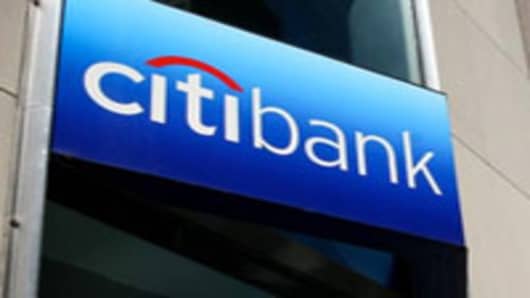Citigroupagreed to buy back more than $7 billion of illiquid auction-rate securities and pay a $100 million civil fine to settle charges it fraudulently misled investors about the debt's risk.
The agreement with New York Attorney General Andrew Cuomo and the Securities and Exchange Commission could pave the way for other settlements stemming from February's meltdown of the $330 billion auction-rate market.
Late Thursday, Merrill Lynch said it will follow Citigroup in cobbling together a settlement for clients who bought auction rate securities, amid growing pressure from its own brokers to pay their clients back.
Confirming a report on CNBC that Merrill was considering such a move, the firm said that effective January 15, 2009, and through January 15, 2010, it will offer to buy at par auction rate securities sold by it to its retail clients.
For Citigroup, the settlement will hinder efforts by Chief Executive Vikram Pandit to slash costs and restore profitability following $17.4 billion of losses in the last three quarters.
"It's really a face-saving attempt," said Brian Yelvington, an analyst at CreditSights in New York. "If Citi is able to pull this off, the other banks that have sponsored these programs could be under pressure to do something similar."
Auction-rate debt has interest rates that reset through periodic auctions, typically held every seven, 28 or 35 days. The market was once considered safe, but much of it remains frozen after Wall Street brokerages stopped supporting the debt.
The market seizure resulted in higher borrowing costs for state and local governments, hurting taxpayers.
Regulators said Citigroup would buy back $7.5 billion of auction-rate debt from about 40,000 retail customers, charities and small or mid-sized businesses by Nov. 5.
Citigroup agreed to fully reimburse retail investors who sold auction-rate debt at a loss.
A panel of CNBC experts discusses the Citi settlement in video at left.
The SEC said the bank will also use its "best efforts" to liquidate -- by the end of 2009 -- an additional $12 billion of the debt held by more than 2,600 institutional investors.
Citigroup will pay a $50 million penalty to New York and $50 million to the North American Securities Administrators Association.
Cuomo had accused Citigroup of wrongly telling customers the debt was safe, liquid and the equivalent of cash.
"This is not just a Wall Street issue, this is a Main Street issue," Cuomo said at a press conference.
He said Thursday's settlement "will help restore confidence in this market," and added, "It does justice for consumers." Cuomo is also probing other companies' auction-rate practices.
Citigroup said its buyback could result in a $500 million pre-tax loss, and would have minimal impact on capital. It also said it has redeemed or auctioned at face value more than half its retail clients' auction-rate holdings.
Citigroup did not admit wrongdoing in agreeing to settle.
Richard Blumenthal, Connecticut's attorney general, said in an interview, "We're hopeful that this settlement sends a very compelling message that others should follow Citigroup's example and do the right thing."
Citigroup has incurred more than $58 billion of write-downs and credit losses since mid-2007 as the housing market deteriorated and capital markets seized up, causing losses on subprime mortgages and other risky debt.
"It's just one more product that's blown up in the face of the investment banks," said William Smith, president of Smith Asset Management Inc in New York. "The problem is they've got to take all these billions of dollars on the balance sheet."
Citigroup was the largest underwriter of auction-rate debt in all but one year this decade, Thomson Financial data show.
Analysts said the auction-rate market might struggle to regain its equilibrium.
"You used to just see the rating and take things for granted," said William Bellamy, director of fixed income at Thompson, Siegel & Walmsley in Richmond, Virginia. "People have to do a little bit more due diligence."
In an unrelated settlement, Massachusetts' attorney general said Morgan Stanley has agreed to pay $1.5 million to reimburse two citiesthat bought auction-rate securities.


